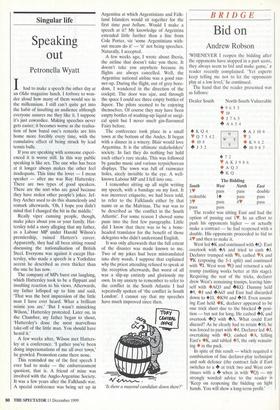BRIDGE
Bid on
Andrew Robson
'WHENEVER I reopen the bidding after the opponents have stopped in a part score, they always seem to bid and make game,' a reader recently complained. 'Yet experts keep telling me not to let the opponents play at a low level,' he continued.
The hand that the reader presented was as follows: Dealer South North-South Vulnerable The Bidding South West North East 111 pass pass double redouble 14 pass pass 3V pass
pass pass
4V pass
The reader was sitting East and had the option of passing out 1V. In an effort to push his opponents higher — or actually make a contract — he had reopened with a double. His opponents proceeded to bid to 4V and then to make it.
West led 4K and continued with 40. East overtook with 4A and tried to cash 4J. Declarer trumped with ♦6, cashed VA and
♦ K (exposing the 5-1 split) and continued with •J. West won IFQ and returned a safe trump (nothing works better at this stage). Requiring the rest of the tricks, declarer drew West's remaining trumps, leaving him- self with •AQ3 and +K(). Dummy held 49, •J and 4A65 and East had discarded down to 410, •K94 and +10. Even assum- ing East held •K, declarer appeared to be one trick short due to the blocked 4 posi- tion — but not for long. He cashed 4K and overtook 40 with +A. What could East discard? As he clearly had to retain 410, he was forced to part with •4. Declarer led •J, overtaking with •Q, cashed *A, felling East's •K, and tabled •3, the only remain- ing ♦ in the pack.
In spite of this result — which required a combination of fine declarer-play technique and soft defence (the contract fails if East switches to a 4 at trick two and West con- tinues with a 4 when in with VQ) — my strongly worded advice to the reader is 'Keep on reopening the bidding on light hands. You will show a long-term profit.'


























































































 Previous page
Previous page